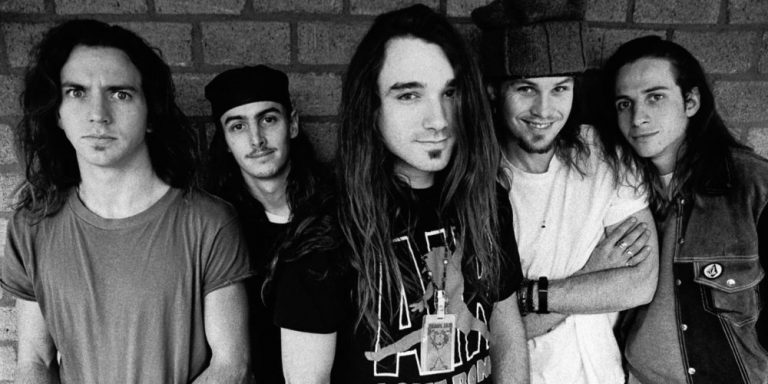Eddie Vedder moved at lightning speed during the early months of Pearl Jam’s existence. The band had formed from the ashes of Seattle glam/grunge group Mother Love Bone, who were reeling from the heroin overdose death of singer Andrew Wood mere days before the planned release of their debut album.
Guitarist Stone Gossard and bassist Jeff Ament reconnected a few months later, recording a number of instrumental songs Gossard had written in the wake of Wood’s death. They teamed with Soundgarden drummer Matt Cameron, and local guitarist Mike McCready, and quickly bashed out the heavier-sounding songs.
The tape, inventively labelled Stone Gossard Demos ’91 (despite being recorded in later 1990), made its way via Red Hot Chili Peppers drummer Jack Irons (who would later join Pearl Jam) to a San Diego musician named Eddie Vedder. Vedder was taken with the dense songs, and came up with lyrics for ‘Alive’ as he went surfing the next morning.
As the story goes, he bolted from the surf to his girlfriend’s house, and out poured lyrics and melodies for three of the songs, captured on Post-it pads swiped from his work. A trilogy of dark, interlocked songs – beginning with ‘Alive’, continuing with ‘Once’ (also on the band’s debut album Ten) and ending with future B-side ‘Footsteps’ – was quickly recorded, assembled onto a tape that Vedder titled Mamasan (the story details a sexually warped relationship between mother and son, and the consequences of this) and sent to Ament.
Ament was blown away, and rushed to the phone: “Stone, you’d better get over here.” Gossard was similarly stoked, and arranged to fly Vedder out to Seattle. Vedder only had one request: he didn’t wanna fuck around, wishing to go straight from the airport to the rehearsal room and start working.
‘Alive’ was fully formed within hours; the band was gigging in a week. Five months later, Pearl Jam were signed to a major and in the studio recording Ten. You know how the rest of the tale goes.
Love Music?
Get your daily dose of metal, rock, indie, pop, and everything else in between.
The Mamasan demo tape simultaneously shows how seasoned the musicians were even at this early stage, and how raw Vedder’s talent was. There’s less of a bite in his vocals than in the finished version of ‘Alive’, but the intensity remains at boiling point. Whereas Wood was a flamboyant frontman with a voice somewhere between Axl Rose and Marc Bolan, Vedder was his own original beast, which appealed to Ament and Gossard, who had auditioned countless Andy Wood impersonators.
It’s funny to think of Vedder’s voice as being original, considering how much its appeal has been watered down over the years by countless, terrible imitators: Three Doors Down, Creed, The Calling, Nickelback, and every terrible diet rock tune in between. To Stone and Jeff in 1990, Vedder sounded fresh and original – on that tape they heard the embryonic growls of what would grow to become a behemoth in a little over a year.

































